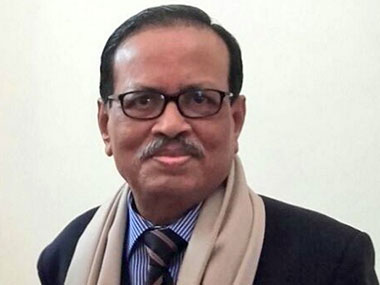The Supreme Court’s bewilderment on Wednesday at the Union home secretary seeking the resignations of state governors over the phone once gain highlights the tendency of using this constitutional post as a political tool. A constitution bench of the apex court, presided over by Chief Justice TS Thakur, made this observation while hearing the petition of former Uttarakhand governor Aziz Qureshi questioning the propriety of sacking governors on the phone. Terming it a serious matter, the bench asked the government to clarify who can ask a governor, a constitutional authority, to resign. Qureshi had felt humiliated when he was asked last year by the then home secretary Anil Goswani to put in his papers. Attorney-General Mukul Rohatgi tried to pass it off not as an instruction to quit, but as ‘friendly’ advice. To this, the judges didn’t bite.
According to The Indian Express, this is what happened next: [caption id=“attachment_2600164” align=“alignleft” width=“380”] File image of JP Rajkhowa. Twitter @KalrajMishra[/caption] The bench then asked the AG “whether being friendly is different from being friends”. The bench also took note of Goswami’s personal secretary calling up former Lt-Governor of Puducherry Virendra Kataria, asking him to resign, and said that it is “very surprising” that anybody could simply pick up the phone and ask a constitutional functionary to quit. “We may have to lay down a format for communications with such high constitutional dignitaries," the bench observed. Central to the grilling of the government by the apex court is the belittling of the office of the governor, a constitutional functionary. While it is true that sacking by phone is a new low introduced lately to diminish the stature of the governors, the latter have contributed in no small measure to their being treated as handmaidens of the party in power. Qureshi’s ordeal is nothing unique as governors of the state are often appointed or suffered, purely on the basis of their political utility or the lack thereof. In this context, Arunachal Pradesh governor JP Rajkhowa will obviously figure no less prominently than those of his predecessors who adorn the “hall of infamy and notoriety” in subverting the Constitution by holding onto their gubernatorial assignments. There is enough evidence to prove that Rajkhowa has acted exactly opposite to his oath of “protecting and defending the Constitution”. That his task was made easier by the Congress does not mitigate his indiscretion. In fact, Rajkhova’s conduct raises a fundamental question about the relevance of retaining the governors in the states. It has allowed them to act as cat’s paws to destablise unfriendly political governments. Governors are supposed to act as a representative of the Indian union in order to guard and protect the Constitution. But one look at the history of gubernatorial conduct would repudiate the high-sounding constitutional obligations to which this post is supposed to be beholden. The Raj Bhavans turning into a palace of political intrigue is an unending story. Take for instance, the running feud between Delhi chief minister Arvind Kejriwal and Delhi’s lieutenant-governor Najib Jung. The running feud between the two has belittled the constitutional posts they hold. In fact, there is little doubt that the use of the governor as political agent of the centre began in 1959 when Prime Minister Jawahar Lal Nehru sacked the Communist regime in Kerala under the influence of his daughter Indira Gandhi. Yet, it took Indira to institutionalise and legitimise this constitutional arrangement by installing governors as puppet of the Centre. In Rajiv Gandhi’s regime, the post of governors further degenerated into a post subservient to the Union home ministry. In reality, the state governors functioned like joint secretaries of the Union home ministry. Take for instance the role of Siddharth Shankar Ray, M Chenna Reddy, Motilal Vohra, Romesh Bhandari, Sundersingh Bhandari, Madanlal Khurana and Buta Singh in their gubernatorial assignments. Most of them have eminently contributed to the decline of the prestige and sanctity attached to the post. But that is one part of the story. Of late there are numerous stories of the governor’s house degenerating into a hub of corruption. Former cabinet secretary Prabhat Kumar who took up the charge of Jharkhand governor was found to be prima-facie guilty of indiscretion in keeping liaison with a dubious Noida-based industrialist. Motilal Vora had to reign as UP governor as his name figured in the recipients of Hawala money in 1996. At the age of 86, three-time UP chief minister ND Tiwari was caught on camera in the company of compromising position with women. That led to his ignominious exit. There are many salacious stories that the Raj Bhavans generate in various state capitals. Apparently the relevance of Governor’s post has been debated many-a-times in the past. The BJP, while in Opposition, was insistent in the past that the issue must be reviewed threadbare to take a position if the post of governors in the state is at all relevant. The history of the governors’ conduct bears this out that governors have more often than not subverted the spirit of the Constitution than protect it. In an era of Narendra Modi’s cooperative federalism where the Centre has been ceding financial autonomy to the states, Rajkhowa’s conduct once again proves that “the more things change, the more they stay the same”. The toppling of the Arunachal Pradesh government through the institution of governors will once again put an unbearable strain on the federal character of the Constitution. But there is hardly anything to suggest that history will not repeat itself.
Arunachal Pradesh governor JP Rajkhowa will obviously figure no less prominently than those of his predecessors who adorn the “hall of infamy and notoriety” in subverting the Constitution by holding onto their gubernatorial assignments
Advertisement
End of Article


)
)
)
)
)
)
)
)
)



